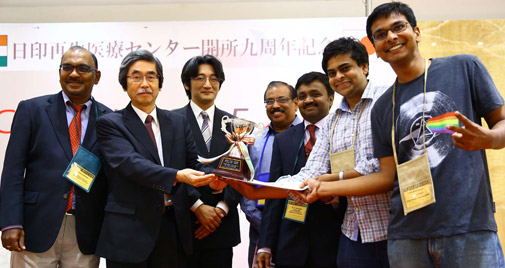| |
Sankara Nethralaya, Sri Venkateswara Varsity & a Japanese team, develop a break-through platform & solution to control Viral Diseases
Growth of Hepatitis C Virus & Control of Chickungunya accomplished in two studies
|
|

Click here for pdf version |
| |
Chennai, Oct11: In an era of viruses like Ebola, threatening the lives of millions in the world, Vision Research Foundation (VRF), Sankara Nethralaya and Sri Venkateswara University Tirupathi have developed (i) a path-breaking hybrid platform to evaluate viricidal agents against HCV and also (ii) a novel solution which has the potential to control various types of viruses; jointly with a team of Japanese scientists associated with NCRM, which was presented in the Inventions, Inter-Disciplinary Interactions And Solutions (IIDIAS) session of the IX Anniversary of Nichi-In Centre for Regenerative Medicine (NCRM).
According to Dr HN Madhavan (VRF), this is the first time in India and second time in the world, a 3D culture of Hepatitis C Virus has been accomplished using a synthetic scaffold, developed by a team of scientists from Waseda University, Japan which is a boon for testing the viricidal properties of several new molecules, both chemical and herbal and to evaluate potential drugs for tackling hepatitis C infection. Dr Sai Gopal from Venkateswara University who has accomplished the successful destruction of Chickungunya virus in the lab using a citric acid based bio similar developed by Japanese physicist Yamaji said that the non-alcohol based technology can be tried in other viruses such as Foot and Mouth Disease, HIV and HCV as well. Combining the above technologies for (i) a virus cultivation in a 3D manner at one hand and (ii) a bio similar based anti-viral compound which is safe to human beings on the other, the possibilities are infinite, commented Dr Sai Gopal.
The national level prestigious Fujio Cup quiz on stem cells for the IX consecutive time was won by the Manipal Institute of regenerative medicine, Bangalore. The chief guest of the event, the Consul general of Japan Mr. Masanori Nakano congratulated the winners and lauded NCRM for their bridging the technological gap in healthcare research between India and Japan.

Please click here for the high resolution picture
Earlier, Dr. Gene Kurosawa, a globally renowned monoclonal antibody researcher from Fujita University, Nagoya, Japan, presented their accomplishments on how an advanced isolation technique in combination with the least modified human derived antibodies which is an original methodology of their institute, can help patients with around 12 types of cancers and many viral infections when the work gets translated into an application.
Related News in Media : Times of India | New Indian Express |


